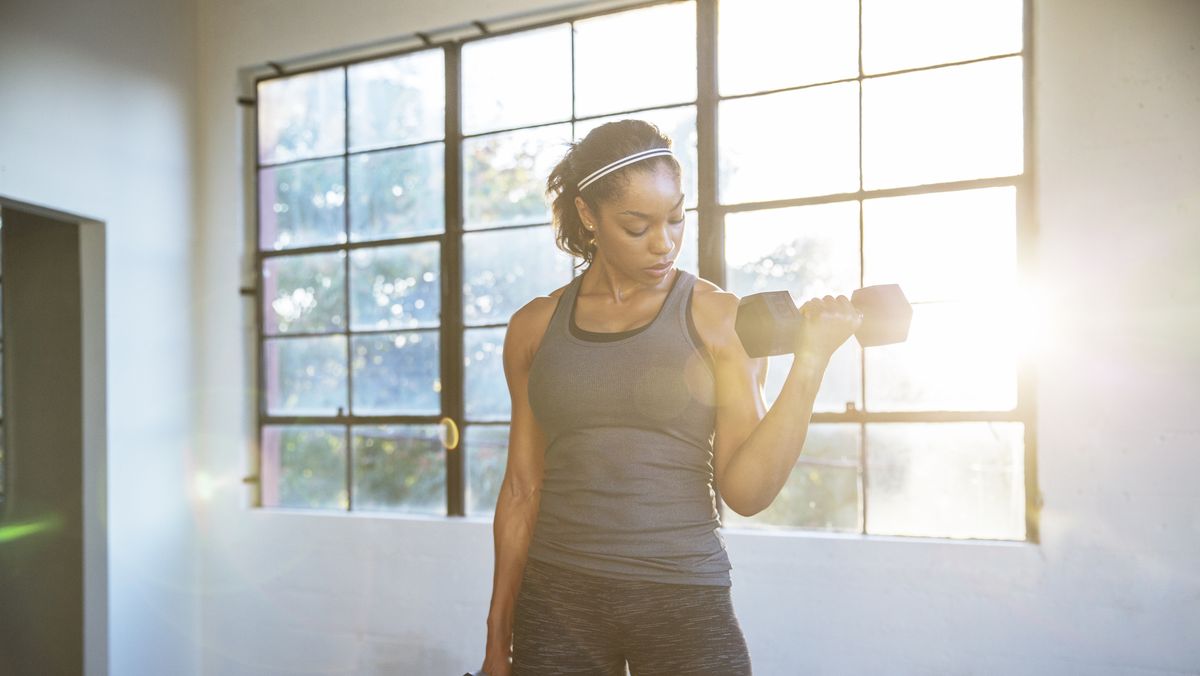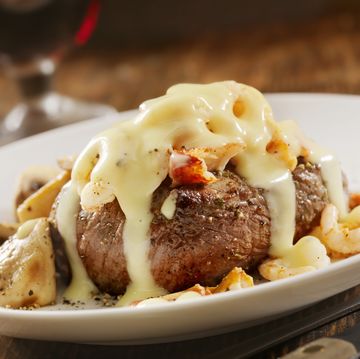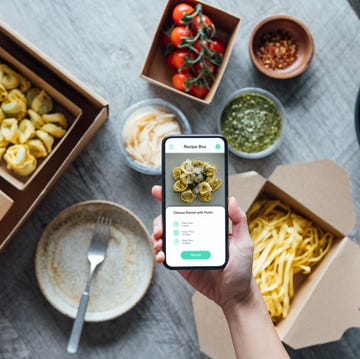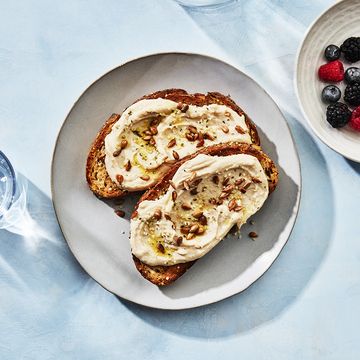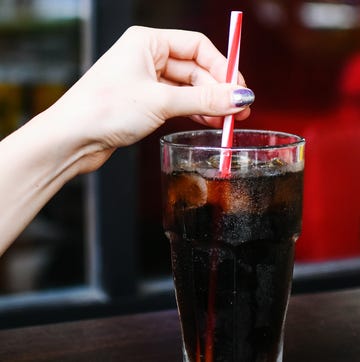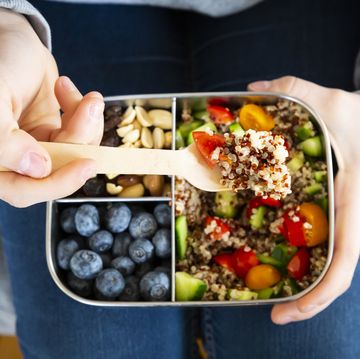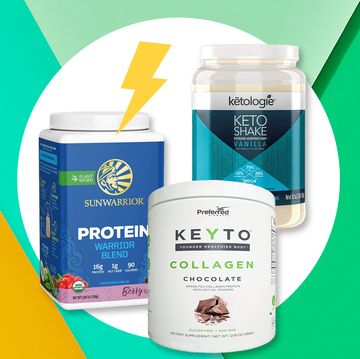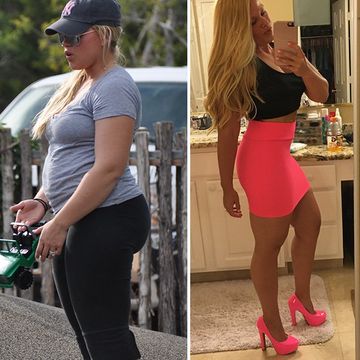The process of losing weight looks different for everyone, and it changes as you age—even if you’ve been a regular exerciser for decades. So, if you’re feeling like losing weight after 40 is trickier than it used to be, that’s completely normal.
For one, your metabolism, body composition, and hormones are all changing, so past weight-loss tricks may not work the same now. Plus, it can take longer before the results start to kick in.
Why? In your 40s, you start to lose muscle mass, which changes the composition of your body, explains Keri Peterson, MD, Women's Health advisor. "Having higher muscle mass raises your metabolism, so your body burns more calories," she adds. If you're losing muscle mass, your metabolism will start to slow down and you expend fewer calories.
Menopause can also slow your metabolism too, Dr. Peterson points out. While it might not take full effect for some women until their 50s, perimenopause—a.k.a., the transitional period right before—typically starts in your 40s. Therefore, the hormonal changes that come with it can affect your ability to lose weight.
So, yes, it is easier to gain weight once you turn 40, explains Dawn Jackson Blatner, RDN, the author of The Superfood Swap. The good news is you can still achieve your weight loss goals with the help of some new techniques, or tweaks to your old ones.
Meet the experts: Keri Peterson, MD, is an internal medicine physician based in New York City. Dawn Jackson Blatner, RDN, is a nutritionist and the author of The Superfood Swap. De Bolton is an NASM-certified personal trainer, corrective exercise specialist, and weight-loss specialist of FaithFueled Mom.
The main focus should be on developing habits that will help you build or maintain your muscle mass. "The most effective way that women over 40 can boost their metabolism is by building muscle through weight-lifting and resistance training," says Dr. Peterson (more on that in a sec). But nutrition and sleep habits also play a role here.
These 20 expert-backed tips for losing weight in your 40s are totally doable and can nudge your body in the right direction again. (TBH, they're wise for anyone looking to move the needle to keep in mind—not just those over 40.) You'll be on your way to a stronger, healthier you in no time.
1. Load up on fruits and veggies.
Vegetables in particular are generally low in cals, yet still packed with vitamins and minerals, and you can really go to town on them. "These are rich in fiber, which makes you feel full, and they're nutrient-dense," says Dr. Peterson. A 2020 study in Nutrients backs this up: Increased consumption of fruits and veggies is consistently linked to weight loss in women.
Making produce the star of your meals can help with portion control too, notes Erin Palinski-Wade, RD, a nutrition and diabetes expert. "If you aim to fill half your plate with vegetables, it can help you reduce the amount of other foods you eat while feeling just as satisfied," she explains. "And since vegetables provide few calories, this strategy can reduce your overall calorie intake at each meal, helping to promote weight loss."
2. Eat *more* protein.
Your body has to work harder (meaning it burns more calories) digesting protein than it does fat or carbs, so Palinski-Wade recommends upping your protein intake. "Although I don’t promote very high-protein diets, increasing your protein intake from 15 percent of your total calories to 30 percent can help you boost the calories your body burns during digestion," she says.
Clinical trials have found that a high-protein diet can not only help with weight loss, but it can also help you keep it off, according to a 2020 review published in the Journal of Obesity & Metabolic Syndrome. That's because it increases your satiety and energy expenditure.
Sarah Mirkin, RDN, the author of Fill Your Plate Lose the Weight, recommends 20 to 30 grams of protein per meal. "It’s important to take in that amount of protein at all your meals, and ideally include high-protein snacks as well," Mirkin says. "This helps prevent lean muscle protein breakdown that decreases muscle mass percentage, increases fat percentage, and slows the metabolic rate. Muscle burns calories. Fat doesn’t."
Not totally sure how to calculate your macros on your own? Consider working with a nutritionist to figure out your numbers—then you can use a macro calculator to track your food intake and make sure you're hitting those numbers. There are lots of free calculators online, and you can also ask your RD to point you in the right direction.
3. Limit your consumption of fried foods.
Yeah, you've probs heard this diet tip before—as it's wise for anyone trying to lose weight. Fried foods contain a whole lot of fat and contribute to weight gain—simple as that. And that's backed up by research, But again, in your 40s, you deal with natural physiological changes that make it *even* tougher to shed excess pounds, so overdoing it on fried foods has larger consequences.
"A 20-year-old can get away with eating empty-calorie meals. A 40-year-old usually cannot on a semi-regular basis," Mirkin says. "Until we are age 20, our bodies are building muscle. After age 20, it stops."
Instead, swap your fried foods for oven-baked options (think: homemade baked sweet potato fries), suggests Palinski-Wade. "You still enjoy the same great-tasting foods, but can save around 100 calories or more per meal," she says. Score!
4. Make your breakfast nice and hearty.
If you're a breakfast person, what you eat in the a.m. can set the tone for the rest of your day as far as weight loss goes (whether you're 40 or not!).
"A breakfast rich in lean protein, fiber, and plant-based fats is the best option for curbing hunger and cravings later in the day," notes Palinski-Wade. In other words, start off with a breakfast that fits this bill, and you may end up slashing calories throughout the rest of the day.
5. Watch what you eat at night.
It's a myth that eating at night leads to weight gain, Palinksi-Wade says; it's more about what you're eating at night that can be an issue when it comes to weight management. People who snack on high-carb foods at night end up consuming more calories overall, per a 2022 Nutrients review.
"Since most of us don’t have a salad for a midnight snack, if you find you tend to eat calorie-dense, high-sugar foods in the evening (like a bowl of ice cream), setting guidelines as to when to stop eating may help you to lose weight faster," Palinksi-Wade suggests.
6. Eat slowly and mindfully.
That delicious plate you just bought or cooked up might tempt you to gobble it up in just a few bites, but that's probably not the best idea, says Palinski-Wade. "Eating slowly, eliminating distractions at meals, and even putting your fork down in between bites all allow you to get in touch with your body’s satiety signals and to stop eating when satisfied," she says.
There's science to support this. Some researchers think that having food in your mouth longer may promote the release of gut hormones that reduce appetite, according to a 2022 Nutrition Bulletin meta-analysis.
The key is listening to your body. "Eat when you’re hungry, not starved," Mirkin says—and stop when you are satisfied, not stuffed. "Try to include small, frequent meals that are high in protein and vegetables with a small amount of healthy fat to fuel your body evenly throughout the day," she says.
7. Drink less soda.
"Soda is just empty calories from sugar and provides no nutritional benefit," says Palinski-Wade. In fact, drinking these bubbly beverages was directly linked to weight gain even for people who exercise on the reg in a 2020 study published in the International Journal of Behavioral Nutrition and Physical Activity.
Weight loss aside, drinking simple sugars is bad for your health too because it can spike blood sugar and insulin levels, causing your body to store more fat, Palinski-Wade says—and that fat is tougher to shed over 40. Instead, choose naturally flavored seltzer with as little added sugar as possible.
8. Cut down on alcohol too.
It's an easy way to cut calories and you'll be doing it for your long-term health too. Evidence has shown even moderate alcohol consumption can cancel out the beneficial effects of weight loss in premenopausal women with obesity. "Plus, drinking often leads to making poor food choices," notes Dr. Peterson.
The emphasis is on reducing, not eliminating, intake. Palinki-Wade recommends reserving your night-cap for one day a week since alcohol can stimulate appetite and make it easier to overindulge.
9. Add hormone-balancing foods to your diet.
It's no secret that your hormone levels change as you enter the next phase of life. "During menopause, the hormone estradiol decreases. Since this hormone helps regulate metabolism, a decrease may lead to weight gain," explains Palinski-Wade.
An easy fix? Tweak your diet to help with these hormonal shifts. "Eating foods that are rich in phytoestrogen (dietary estrogen), such as flax seed, sesame seeds, dried fruits, and soybeans, may help offset these changes," she says. Some research has shown the Mediterranean diet, which consists of foods with anti-inflammatory properties and antioxidants, is associated with small but significant reduction of fat mass and improved health markers in menopausal women.
10. Do a total-body strength routine.
Try adding a total-body strength routine to your existing workout around one to two days a week, suggests De Bolton of FaithFueled Mom, a NASM-certified personal trainer, corrective exercise specialist, and weight-loss specialist who has worked with older clients. Premenopausal women who did strength training twice a week for two years decreased their body fat percentage, according to an older study in the American Journal of Clinical Nutrition.
Bolton recommends focusing on individual muscle groups: "Break it up—leg day; back and biceps; chest, shoulder, triceps; and then on the other two days add cardio and core." This routine checks every box: It has strength training to help build muscle, cardio to maintain your cardiovascular health, and core exercises to help with balance and mobility, she says.
11. Focus on training your core.
Ab workouts can help target belly fat, but don't expect your stomach to be magically toned. "You can't just do one thing all the time and then all of a sudden, that area's going to be great. Unfortunately, it doesn't work like that," Bolton says explains. But training your transverse abdominals (a.k.a. your "inner girdle," according to Bolton) can help you stay active and target your waistline.
Plus, there are plenty of other benefits that come with a sculpted core: For women over 40, "their core is going to help them move around longer, stay on their feet upright longer," Bolton says. It's a win-win.
12. Balance training is major.
Balance training involves strengthening two muscle groups—your abs and your butt. While it might not seem like a necessity right now, focusing on your balance sets you up for being able to stay active longer in the future. "You doing these things at 40 is going to allow you to have an amazing 50," she says.
13. If you're starting from scratch, work your way up.
Ready to build a new fitness routine, but not sure where to start? There are plenty of ways to get moving at home, says Ellen Regenbogen of Ellen Bari Fitness, a certified master trainer.
"You can actually do some cardio in place," she says, like jogging in place, sidestepping, or doing jumping jacks. Or grab some water bottles and try a few biceps curls. "You can do some arm circles," she adds, "you can sit on a chair and you can do extensions." And, don't worry about trying to do everything at once: "It's just making that first step," Regenbogen says.
14. Be careful not to overexercise.
You may be super committed to your goal of dropping a few pounds, but remember rest days are important too. "I see this mistake so often, and it backfires every time," says Mirkin. "Your body perceives this as a major stressor on the body and your metabolism slows down to preserve body fat." Craving a break? Take it—your bod will thank you.
15. Track what you eat using a food diary app.
People who track what they eat tend to lose more weight than those who don't, Palinski-Wade says. "That’s most likely because these individuals are more aware of what they are putting into their body, which can help them to make better choices and better moderate [their] portion size," she explains.
If you're unsure of how many calories you need to consume to maintain your weight, there are calorie calculators you can use, says Dr. Peterson. "They tell you the amount of calories you need to consume to maintain your weight based on your gender, age, height and activity level," she says.
16. Stay hydrated.
You've probably heard this one before, but try your best to drink more water. Increased water intake can suppress your appetite and ramp up fat breakdown, according to research. "Water is very stimulating," says Regenbogen. "It goes through your body, detoxes your body. Hot water with lemon is very mindful for the body," she adds.
Currently, the Institute of Medicine of the National Academies recommends that women consume 2.7 liters, or 91 ounces, of water every day—that's from food and drinks combined, FYI. But, there are lots of other factors that could affect how much H2O you really need, so it's a good idea to set personal #hydrationgoals.
17. Try to reduce stress.
Stress, which plenty of women experience more of as they age and work and family responsibilities pile up, can lead to an increase in hormones like cortisol, which cause your body to store fat rather than burning it.
To minimize your stress, Palinski-Wade suggests practicing breathing exercises every day, especially before bed. Another option? Eat foods rich in vitamin C and omega-3 fatty acids, which Palinski-Wade says have been found to reduce the levels of stress hormones circulating in the body.
18. Get your thyroid checked.
Hypothyroidism, a condition where the body doesn't produce enough thyroid hormone, can sometimes lead to weight gain, but that alone doesn't mean you have an underactive thyroid. This condition tends to affect women in middle age, so it's important to rule it out if you're struggling with weight loss.
If you are taking the appropriate measures (e.g., eating enough of a calorie deficit for your age and body composition, stressing less, and working on strength training) and still not losing weight, and you also have other symptoms of hypothyroidism (such as constipation, fatigue, dry hair and nails), then it may be worth considering getting your thyroid levels checked," advises Dr. Peterson.
19. Get a good night's rest...regularly.
Difficulty sleeping can be a symptom of menopause, so it's not uncommon for women in their 40s to struggle with getting enough sleep. Unfortunately, this can also cause weight gain. "When you get less than seven hours of restful sleep, metabolic changes occur that can make it significantly harder to lose weight," says Palinksi-Wade. "The appetite hormone ghrelin is increased while leptin (which controls hunger cues) is reduced, triggering an increased desire to eat, especially foods rich in fat and sugar. Insulin resistance increases, which can trigger the body to store fat."
If you're struggling to fall asleep and stay asleep, try these tips for making your bedroom the optimal sleep environment.
20. Get support from your friends and family.
Dr. Peterson and Palinski-Wade both agree that a support system can keep you accountable at any age. Having both accountability and support from family members can affect one's long-term commitment to a weight loss program, a 2022 study found.
"It’s much easier to motivate yourself to go to the gym when a friend is there waiting for you. And it’s much easier to eat nutritious meals when your family and friends aren’t pressuring you to have another cookie," says Palinski-Wade.

Jasmine Gomez is the Commerce Editor at Women’s Health, where she cover the best product recommendations across beauty, health, lifestyle, fitness, and more. When she's not shopping for a living, she enjoys karaoke and dining out more than she cares to admit. Follow her @JazzeGomez.
Addison Aloian (she/her) is an editorial assistant at Women’s Health. When she’s not writing about all things pop culture, health, beauty, and fashion, she loves hitting leg day at the gym, shopping at Trader Joe’s, and watching whichever hockey game is on TV. Her work has also appeared in Allure, StyleCaster, L’Officiel USA, V Magazine, and Modern Luxury Media.
